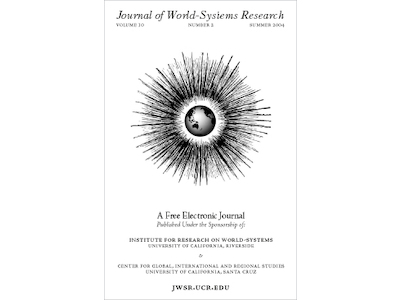Dominant Capital and the New Wars
Bichler, Shimshon and Nitzan, Jonathan.
(2004).
Journal of World-Systems Research. Vol. 10. No. 2, August. pp. 254-327.
(Article - Journal; English).
![[img]](http://bnarchives.yorku.ca/1/3.hassmallThumbnailVersion/040813BN_Dominant_Capital_%26_the_New_Wars_cover.jpg)
|
Cover Image
040813BN_Dominant_Capital_&_the_New_Wars_cover.jpg Download (45kB) | Preview |
|
|
PDF (Full Text. One-page view)
040813BN_Dominant_Capital_&_the_New_Wars_(1PageView).pdf Download (1MB) | Preview |
|
|
PDF (Full Text. Two-page view)
040813BN_Dominant_Capital_&_the_New_Wars_(2PageView).pdf Download (1MB) | Preview |
Alternative Locations
http://www.jwsr.org/wp-content/uploads/2013/03/jwsr-v10n2-bandn.pdf
Abstract or Brief Description
The recent shift from ‘global villageism’ to the ‘new wars’ revealed a deep crisis in heterodox political economy. The popular belief in neoliberal globalization, peace dividends, fiscal conservatism and sound finance that dominated the 1980s and 1990s suddenly collapsed. The early 2000s brought rising xenophobia, growing military budgets and policy profligacy. Radicals were the first to identify this transition, but their attempts to explain it have been bogged down by two major hurdles: (1) most writers continue to apply nineteenth century theories and concepts to twenty-first century realities; and (2) few seem to bother with empirical analysis.
This paper offers a radical alternative that is both theoretically new and empirically grounded. We use the ‘new wars’ as a stepping stone to understand a triple transformation that altered the nature of capital, the accumulation of capital and the unit of capital. Specifically, our argument builds on a power understanding of capital that emphasizes differential accumulation by dominant capital groups. Accumulation, we argue, has little to do with the amassment of material things measured in ‘utils’ or ‘dead labour.’ Instead, accumulation, or ‘capitalization,’ represents a commodification of power by leading groups in society. Over the past century, this power has been re-structured and concentrated through two distinct regimes of differential accumulation – ‘breadth’ and ‘depth.’ A breadth regime relies on proletarianization, on green-field investment and, particularly, on mergers and acquisitions. A depth regime builds on redistribution through stagflation – that is, on differential inflation in the midst of stagnation. In contrast to breadth which presupposes some measure of growth and stability, depth thrives on ‘accumulation through crisis.’
The past twenty years were dominated by breadth, buttressed by neoliberal rhetoric, globalization and capital mobility. This regime started to run into mounting difficulties in the late 1990s, and eventually collapsed in 2000. For differential accumulation to continue, dominant capital now needs inflation, and inflation requires instability and social crisis. It is within this broader dynamics of power accumulation that the new wars need to be understood.
Language
EnglishPublication Type
Article - JournalKeywords
Arms accumulation capital capitalism conflict corporation crisis distribution elite energy finance globalization growth imperialism GPE liberalism Middle East military national interest neoliberalism oil OPEC ownership peace power profit ruling class security stagflation state stock market technology TNC United States US violence warSubject
BN Civilization & Social SystemsBN Theory
BN State & Government
BN Region - Middle East
BN Cooperation & Collective Action
BN Industrial Organization
BN Civil Society
BN Hegemony
BN Institutions
BN Power
BN International & Global
BN Region - North America
BN Business Enterprise
BN Value & Price
BN Crisis
BN Production
BN War & Peace
BN Money & Finance
BN Conflict & Violence
BN Science & Technology
BN History
BN Ideology
BN Methodology
BN Agency
BN Comparative
BN Resistance
BN Capital & Accumulation
BN Policy
BN Class
BN Growth
Depositing User
Jonathan NitzanDate Deposited
29 Jan 2007Last Modified
01 Apr 2016 00:24URL:
http://bnarchives.yorku.ca/id/eprint/1Commentary/Response Threads
- Bichler, Shimshon and Nitzan, Jonathan Dominant Capital and the New Wars. (deposited 29 Jan 2007) [Currently Displayed]
Actions (login required)
 |
View Item |

